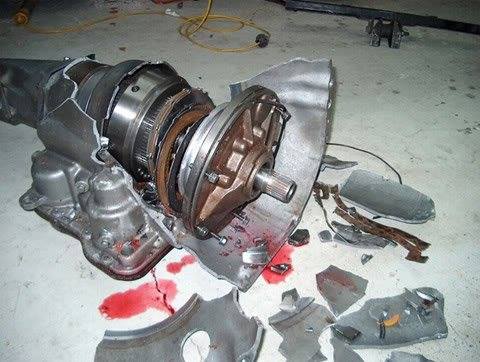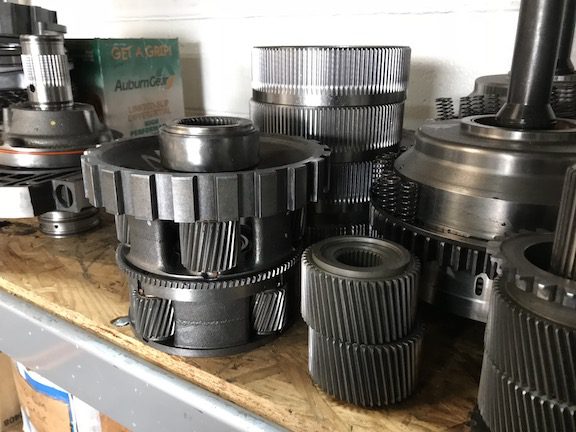Look for These Transmission Failure Signs
Transmission related repairs tend to be one of the costliest when it comes to your vehicle. This is why it’s important to catch signs of transmission failure as early as possible. In most every case you can avoid costly repairs simply by having transmission work done on your vehicle at regularly scheduled intervals per your vehicle’s OEM maintenance calendar. Most every vehicle manufacturer will have this information published either online or printed in the vehicle’s user and service manuals.
But what if you bought a used car? What if you have an older car with a lot of mileage? Regardless, as a vehicle owner it’s in your best interest to know a thing or two about your transmission and what signs of transmission failure to look and listen for.
Contact General Transmission Reno

Blown Transmission
Look for odd sounds, leaking transmission fluid or a slipping clutch.
Before we get into transmission failure signs, we need to reiterate that it’s always important that you take your car to an expert transmission technician who’s capable of running diagnostics. This can save you a lot of money in the long-run and keep you from spending cash on unnecessary repairs.
Without going into too much detail, the transmission in your vehicle is what allows your car to transfer horsepower and torque produced by the engine through a clutch and a series of gears, down a drive shaft, to a differential and then to the wheels. A transmission contains many moving parts and gears that all function to work as one unit. Typically, when one part begins to fail, your entire transmission suffers and the unit as a whole develops problems.
Signs of Transmission Failure:
-
Warning Light Comes On.
Many modern vehicles have a vast array of sensors and electronic devices that monitor all aspects of a vehicle. In most cases, a warning light will appear in your dash when it senses something is wrong with the transmission. These warnings can be cryptic, meaning it’s time to take your car to a transmission specialist for diagnosis.
-
Leaking Transmission Fluid.
Because your transmission contains many moving parts and gears, they require lubrication to prevent from overheating and seizing up. This is where having enough fluid in your transmission is critical. If you spot transmission fluid leaking, take your vehicle to transmission shops in your area for a diagnosis. They’ll be able to tell you if you simply need a new seal or if it’s something more serious. Regardless, you want to make sure your transmission has enough fluid at all times. All Automatic Transmission Fluid (ATF) is bright red and has an unmistakable sweet odor.
-
Excessively Dark, Non-Viscous Fluid.
Over time, transmission fluid (like engine oil) will become thicker and darker – this is normal, but you want to keep an eye on this. Depending on the vehicle, transmission fluid can be good for up to 60,000 miles (consult your service manual for when you should replace transmission fluid). If it’s been a long time since your transmission fluid was replaced, have your transmission specialist check the fluid’s viscosity and coloration. Super dark, thick, non-viscous fluid can lead to overheating and cause excessive wear on the moving components in your transmission and lead to failure later down the road.
-
Overheating.
Excessive heat buildup in your transmission stems from a lack of or the wrong type of transmission fluid. Excessive heat buildup is the number one sign of failure. To make sure that your transmission doesn’t overheat, it’s important to periodically check for leaks and top your fluid levels off at regular intervals as specified by the vehicle manufacturer.
-
Transmission Slipping Gears.
If your car makes grinding, shaking, jumping or jerking moves and noises when you drive it, then you have a problem with the gears in the transmission housing. At this point, be sure to have a transmission specialist inspect and diagnose the problem. If you catch this problem earlier rather than later you stand to save by not having to replace gears and other components.
-
Slipping Clutch.
This is a harder problem to detect in vehicles with automatic transmissions as compared to vehicles with manual transmissions. In an automatic transmission you won’t be able to feel the clutch engage in the same way as you would a manual. A slipping clutch could be one of the signs of clutch failure as opposed to transmission failure, but regardless you’ll feel clunky and jerky gear changes and sometimes experience a burning smell.
-
Transmission Shifting Delays.
Delays between gear shifts tend to be more common in modern vehicles that rely on electronics and various sensors. If your vehicle is experiencing this problem, it may not necessarily be a problem with the transmission itself, but a problem with your vehicles ECU or sensors. This is a more advanced problem requiring the special attention of a transmission specialist.
What if it’s too late? Why it’s better to rebuild than replace your transmission.
While replacing your transmission sounds like it would be the better investment, you’d be wrong. A full-blown transmission replacement tends to be very costly because you are replacing the entire transmission unit. More often than not, your transmission only contains a few failing components.
When it comes down to it, it’s better to rebuild your transmission than to replace it. Rebuilding your transmission requires that the technician disassemble your transmission and inspect all of its moving components. This frequently reveals the source of the failure. Once the transmission specialist spots the problem, they can fix things simply by replacing the part. Rebuilding your transmission with select components will almost always save you money so go to transmission shops that will be rebuild rather than replace!
Connect with General Transmission Reno today!
If you have any questions or are in need of some transmission work on your vehicle, give General Transmission a call today. We’re a family owned transmission repair shop built on values and integrity and we’re more than happy to answer any and all questions!
Contact General Transmission Reno

 After Hours Contact
After Hours Contact Finance OPtions
Finance OPtions
